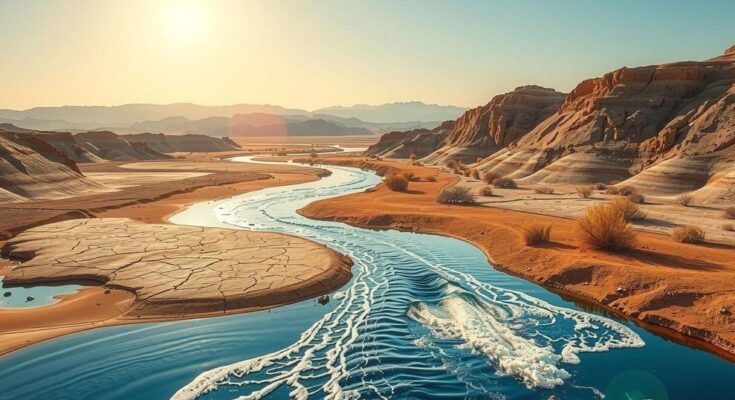Residents of Iran’s Sistan and Baluchestan are facing severe drought due to Afghanistan’s ongoing diversion of water from the Kamal Khan Dam to Godzareh. Despite Taliban promises to cease this practice, satellite images confirm continued redirection. Iran insists on adherence to the 1973 Hirmand River treaty to secure its water rights amid these challenges.
Residents of Iran’s Sistan and Baluchestan province have been struggling with severe droughts caused by water scarcity and Afghanistan’s failure to meet water-sharing agreements. In light of these challenges, they are urging President Masoud Pezeshkian and the Ministry of Foreign Affairs to take immediate measures to secure Iran’s rightful portion of water from Afghanistan.
Recent satellite imagery reveals that despite earlier statements from Taliban officials regarding the cessation of water diversion to Godzareh, water continues to be redirected from the Kamal Khan Dam into the salt flats of Godzareh. This situation has persisted despite guarantees from the Taliban that they would uphold water distribution as agreed upon in treaties.
Previously, Taliban authorities had cited drought and insufficient rainfall as justifications for not releasing Iran’s legal share of water from the Hirmand, also known as Helmand. Nevertheless, recent heavy rains and floodwaters from Afghanistan initially raised hopes that the Taliban would comply with their commitments.
Iran maintains that Afghanistan is legally obligated to adhere to the 1973 Hirmand River water treaty and to ensure the equitable distribution of water from the river. The ongoing situation reflects a significant obstacle to achieving water security for the affected Iranian communities.
In summary, the ongoing diversion of water from Afghanistan to Godzareh contradicts the Taliban’s prior assurances to Iran. Despite recent floods raising expectations for better compliance with water-sharing agreements, the persistent drought justifications hinder progress. Iran continues to emphasize the importance of the 1973 Hirmand River water treaty to secure its legal water rights.
Original Source: ifpnews.com




